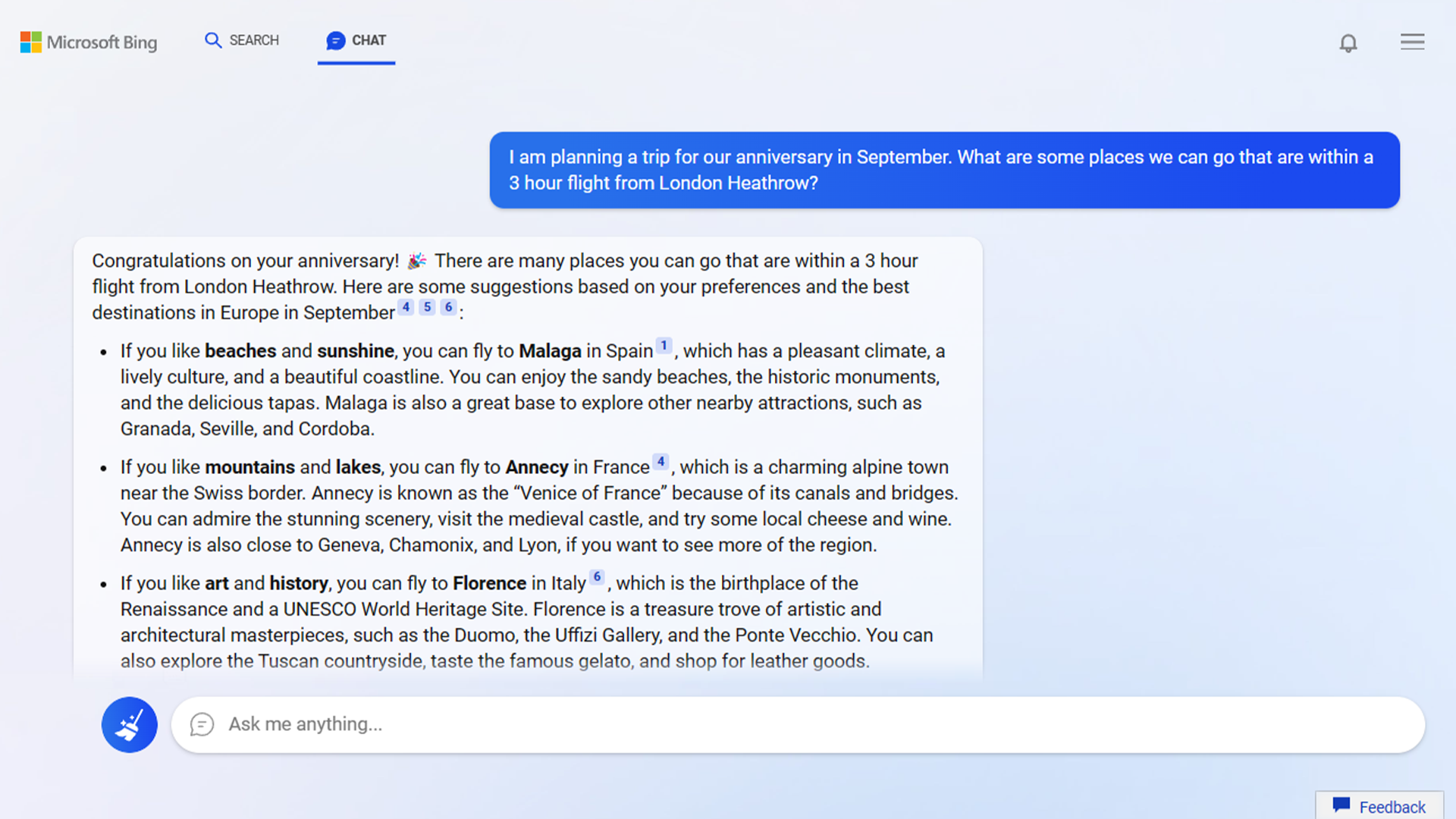ChatGPT and Google’s Bard are both language models developed by OpenAI and Google, respectively. These models perform various natural language processing tasks, including text classification, question answering, and machine translation.
In the context of paid search, these models could have a positive effect by improving the accuracy and relevance of search results. For example, ChatGPT and Bard could be used better to understand the intent behind a user’s search query, allowing for more targeted and relevant ad messaging. Plus, these models could improve the quality of the search results by ranking the most relevant pages higher and reducing the prominence of low-quality or spammy sites.
However, we need to ask the question: how will integrated AI features impact paid search results for search marketing?
Reasons to introduce AI into search
As AI-generated content appears more widely on SEPRs, we will see an increase in zero-click searches. Of course, zero-click searches aren’t new (an answer is immediately given when searching for how old Madonna is). However, in the short term, it’s expected that the impact will mainly be on informational keywords and much less on transactional keywords.
As a result, there will be a switch from traffic to visibility. This could mean rethinking our current strategies.
However, there is still a lot of uncertainty with AI in search. For example, what will happen with the ad revenue model if Google and Bing stop sending users and visits from their search engines to websites? And as a consequence, if publishing a website won’t be a viable business in the future, where are Bing and Google Search expecting to fetch the information they need to present results and train their Large Language Models? These questions – and more – will be answered in time!

Image courtesy of Microsoft
ChatGPT on Microsoft Bing
Overall, the potential for AI models to disrupt the monetisation of paid search is significant.
As seen in the example above, the preview of Bing search results displays the standard organic and paid search results on the left and the AI-driven content from ChatGPT on the right. This updated layout partially re-invents the SERP and adds complexity with an entirely new feature.
This new feature could divert user attention from paid/organic listings toward AI-driven content. If this happens, advertisers could see potential negative impacts on click volume.
Image courtesy of Google
Bard on Google
We have a preview of how Bard will integrate into the Google SERP. The image appeared in the Bard announcement made by Google on February 8th.
Like Bing, the SERP on Google has yet to be wholly re-engineered, but the AI-generated content appears at the top of the page, and the paid/organic results are listed below. This SERP evolution should have a similar impact as Bing. The paid/organic results have not disappeared, but users may be delivered AI-driven content before the SERP links, negatively impacting paid/organic click volume.
User behaviour influenced by AI
As we can see, the user experience of the SERP will be undergoing a significant change. We need to understand how these changes influence user behaviour on Google and Bing.
AI-driven content from ChatGTP and Bard will be beneficial because users often turn to search for answers and information. This isn’t going to change.
However, people across the globe begin their search for products, software, services, and local results on Google or Bing, and currently, AI-driven content might not be able to satisfy those needs.
AI content from ChatGPT or Bard may influence those purchase decisions, but it is not presenting products or services (yet). This evolution of search will have challenges and require new modes of thinking – but new opportunities too.
When new AI will change the SERP
The development of these AI features within search is happening quickly in 2023.
Microsoft Bing is now building a waitlist for users to access the “New Bing Experience” with ChatGPT functionality. The rollout for all Bing users has yet to be released. With Bing’s heightened media attention and potential market share gain, the rollout beyond the beta is likely only a few months away. We are on the waitlist! And so far, over a million people have signed up too!
Google still needs to provide the official release date for Bard. However, their announcement states, “we’re taking another step forward by opening it up to trusted testers ahead of making it more widely available to the public in the coming weeks.”
These AI-driven features will fully roll out in Google and Bing throughout Q2 2023.
Steps you can take right now
Boost investment in Microsoft Bing
Interest in Bing has peaked, which is a good thing. If Bing can ride this wave of interest, it could take a small percentage of search volume from Google. This is a good thing! We want more diversification across platforms. Ensure that you have ported all your Google campaigns into Bing.
Migrate to broad match in Google & Bing
User behaviour on the SERPs is going to change. If AI-driven content impacts use behaviour, we must proactively develop strategies that drive impression and click volume. Teams should begin testing broad match now. Also, our POV is that phrase match will be retired in the next 12 months, so we should start planning for this change.
Utilise automated bidding algorithms
Most accounts have adopted smart bidding. We must lean into automation to drive volume and effectiveness for clients. Smart bidding will gain importance if we see negative impacts on click volume in the future due to AI content.
Stay updated with the latest information
The DEPT® growth marketing team will continue to provide information and insights as this technology develops.
10 perspectives on AI and what it means for brands & agencies



